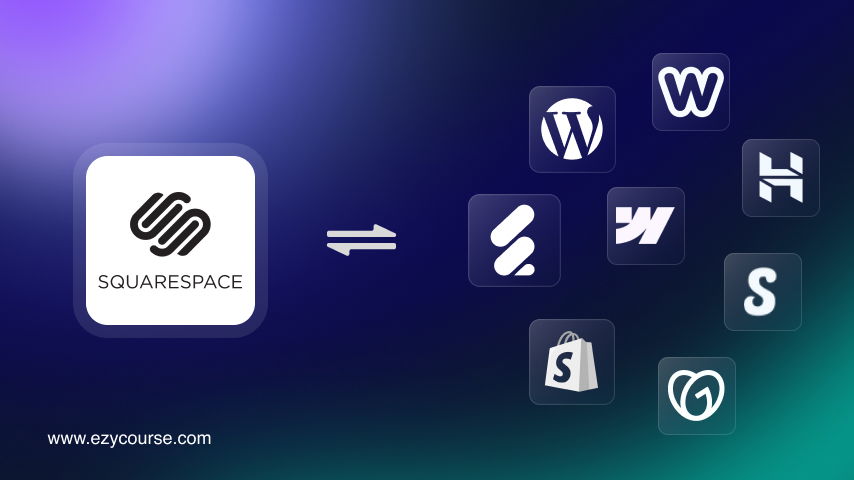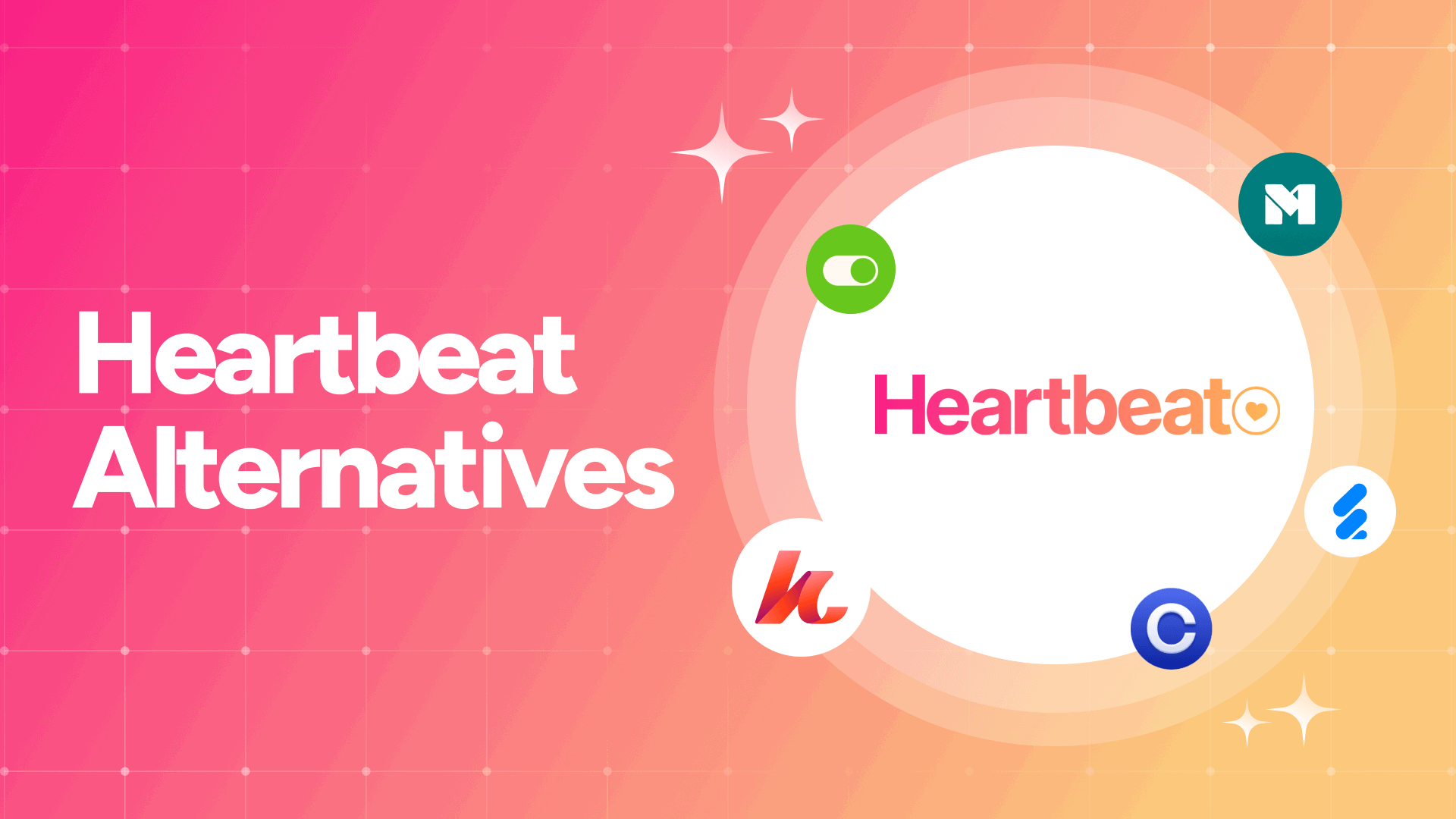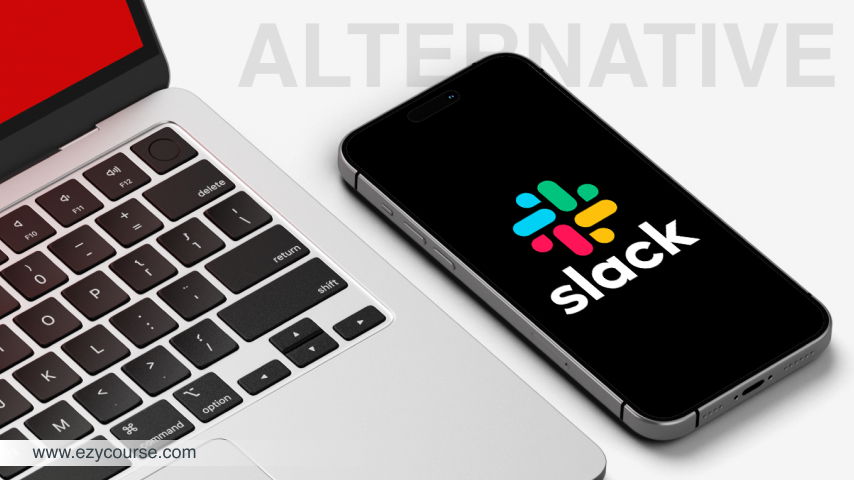Top 10 Wix Alternatives for Course Creators & Entrepreneurs
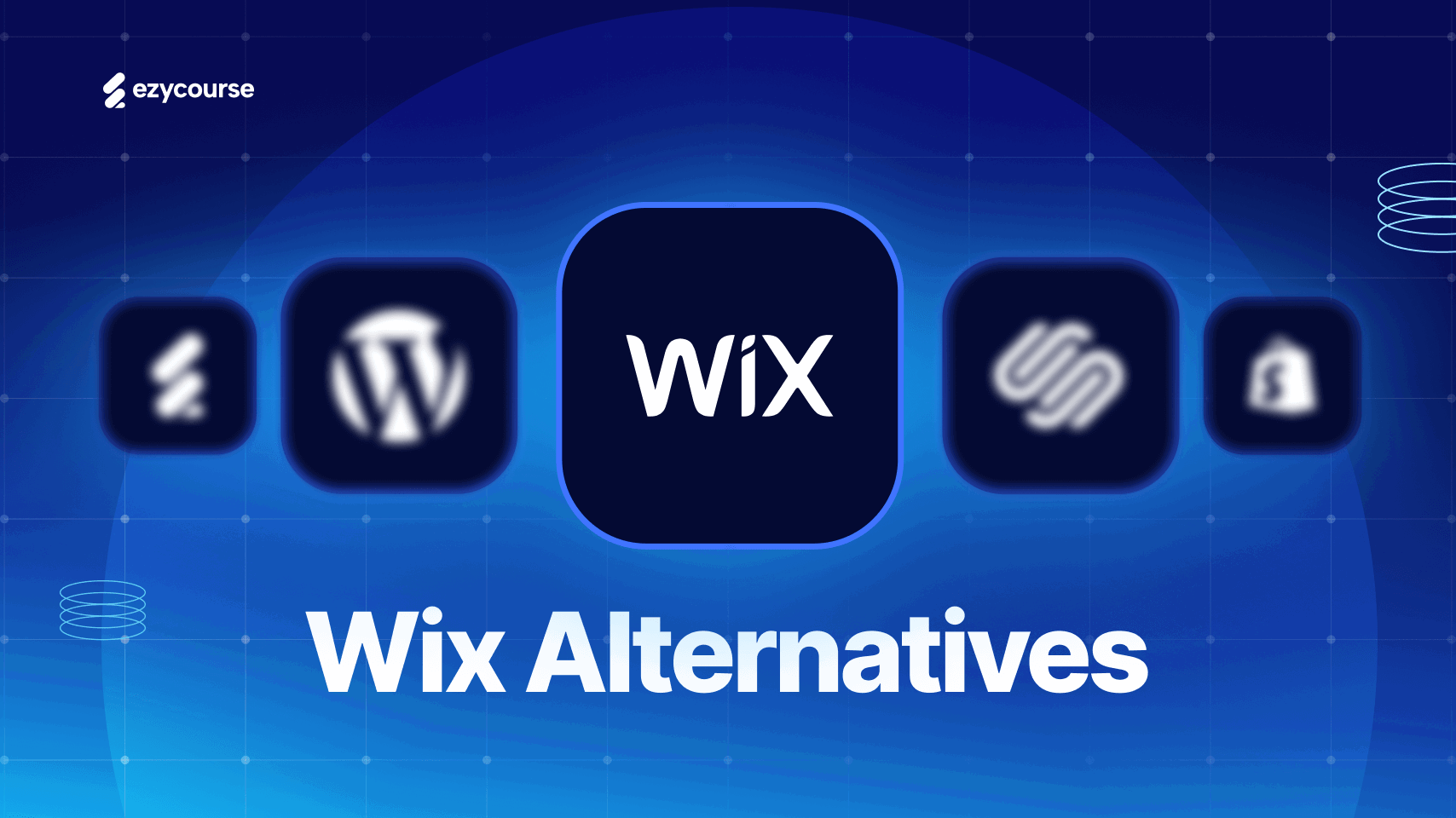
Top 10 Wix Alternatives for Course Creators & Entrepreneurs
Wix is a great website builder with advanced features for both course creators and entrepreneurs. However, you need to have strong technical knowledge to get the best outcome from Wix. The advanced features make Wix a complex platform for beginners.
If you are a course creator or entrepreneur, you might not have the time to learn all the technical complexities of WIx. You just need a simple platform that helps your business grow in the easiest possible way.
This guide covers the top 10 Wix alternatives for course creators and entrepreneurs that are beginner-friendly and offer easy customization, scalability, and affordability.
Let’s begin.
Top 10 Wix Alternatives
Here’s a complete list of the top 10 Wix alternatives for Course Creators & Entrepreneurs:
EzyCourse
WordPress
Shopify
Squarespace
Webflow
Weebly
Webnode
Duda
Hostinger Website Builder
Jimdo
Let’s get into the details of each platform to help you choose the right one for your online courses and online businesses.
1. EzyCourse
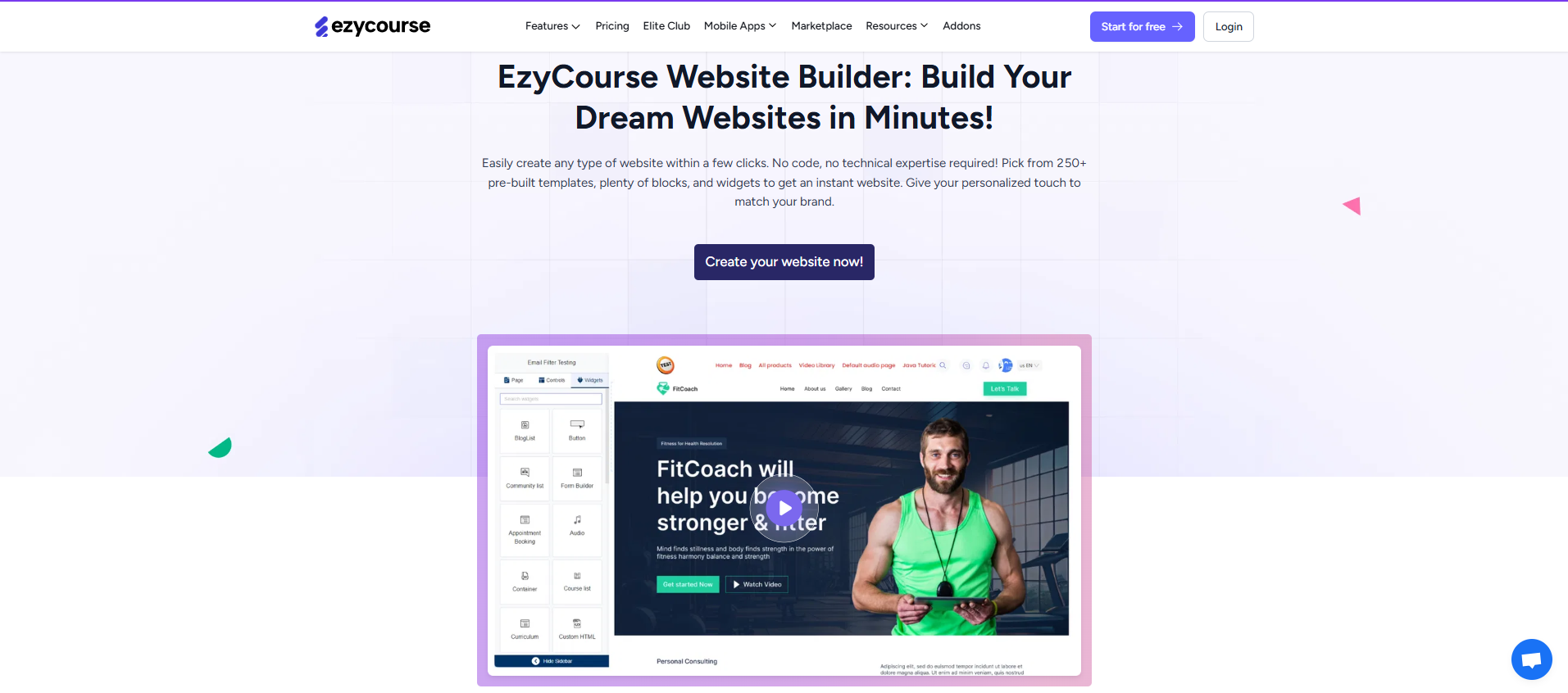
EzyCourse is one of the best platforms for course creators and entrepreneurs to create any type of website. It’s an all-in-one platform for creating and selling physical and digital products with a branded website.
You can create, promote, and sell online courses, products, and services using landing pages and marketing tools. You’ll get multiple income streams in EzyCourse to boost your revenue. Anyone can create membership websites with EzyCourse without any technical knowledge.
Course creators can easily upload videos, audio, PDFs, PowerPoints, and surveys. EzyCourse has all the features your online business needs. This platform offers more than 250 pre-built website templates ranging from course websites to membership sites to any type of e-commerce site. Overall, you can easily create memberships, engage your community, and automate marketing efforts without extra tools.
Key Features
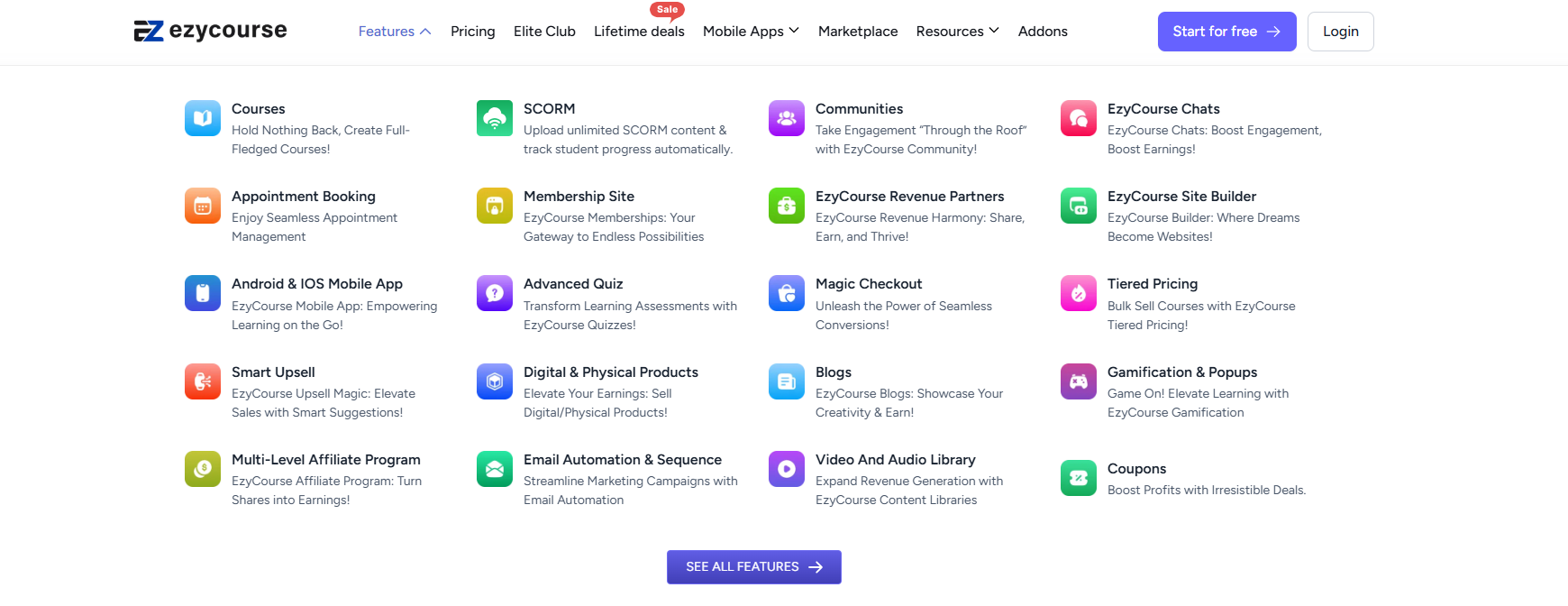
Course Creation: You can create online courses and organize your lessons with a simple drag-and-drop builder.
Monetizing Your Content: You can offer subscriptions, one-time purchases, or memberships for your content. This allows you to decide how you monetize your courses and products.
Global Payments: You can accept payments from anywhere in the world with integrated payment gateways. This ensures you can reach a global audience without worrying about payment limitations or restrictions.
Website Building: You’ll have access to over 250 templates and interactive blocks to create your website instantly. No coding is needed. You can just drag and drop pre-made elements to design your website. You can also create and sell custom blocks and templates to make extra cash.
Custom Branding: EzyCourse customizes your platform without any restrictions to align with your brand and utilizes the drag-and-drop builder to create a white-label website. This offers your learners a unique experience that maintains professionalism.
Marketing Automation: You can set automated email campaigns to nurture your audience to keep your students engaged. From course updates and reminders to promotional offers, you can automate it all for a seamless marketing experience.
Device Accessibility: Your courses are automatically responsive and accessible on any devices actively for your students.
Manage Students: Ezycourse enables you to efficiently track your students' progress, send timely messages, and analyze engagement with built-in tools.
Automate Email Sequences: You can set up email sequences triggered by key events like someone taking a course or being newly enrolled in one. It means you can effectively engage your students with appropriate messages at an optimal time, which can improve retention and satisfaction.
Communities: You can create a community space in which students can chat, support each other, and share experiences. You can apply some community engagement strategies to make the educational process more fun and engaging.
Sell Products and Services: You can easily expand beyond courses and sell digital products as well as physical products and services. EzyCourse allows you to integrate product sales directly with your courses.
Cross-Sell and Upsell: You can increase your revenue by offering smart upsell and cross-sell options at the right time. With these features, you can suggest related products or premium course packages, boosting your revenue per customer.
Affiliate Program: You can launch a multi-level affiliate program to have others promote your courses or products for a commission. This helps you grow your reach and sales without any extra effort.
Advanced Analytics: With comprehensive analytics, you can monitor performance metrics like sales, student participation, and customers’ activities. Such data enables you to optimize your business strategies and ensures that your entrepreneurial ventures are successful.
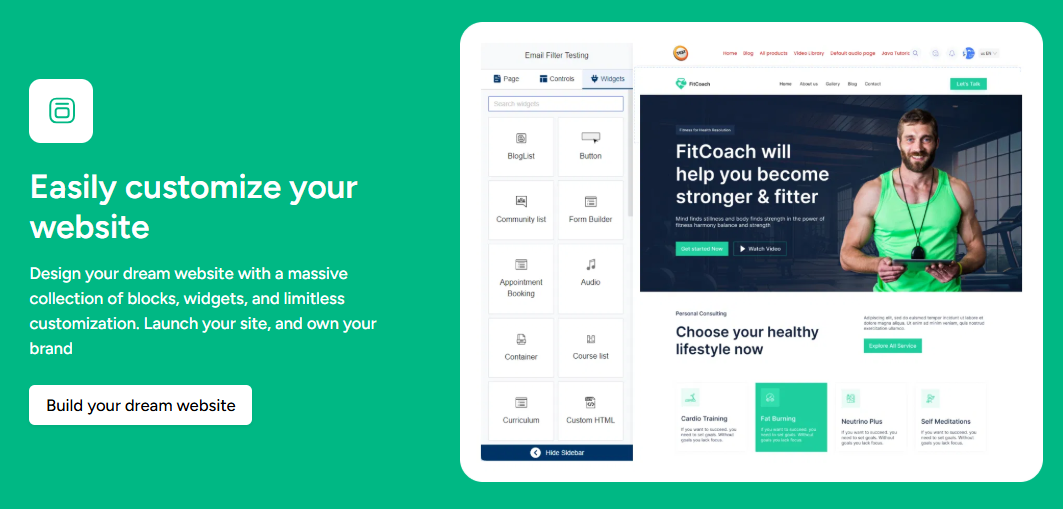
Pros
All-in-one solution
Easy setup with no coding needed
Built-in community and engagement tools
Affordable pricing options
Custom branding allows personalization with logos, colors, and domains
Multiple monetization options
Drip content and course completion tracking for structured learning
Integrated email and marketing tools for automation and sales
Built-in affiliate system to boost sales through referrals
Supports multiple payment gateways like Stripe, PayPal, FastSpring, RazorPay, and more
Live classes and webinars for interactive teaching
Marketplace functionality for multiple instructors to sell courses
24/7 customer support for reliable assistance
Cons
Limited e-commerce features
Pricing
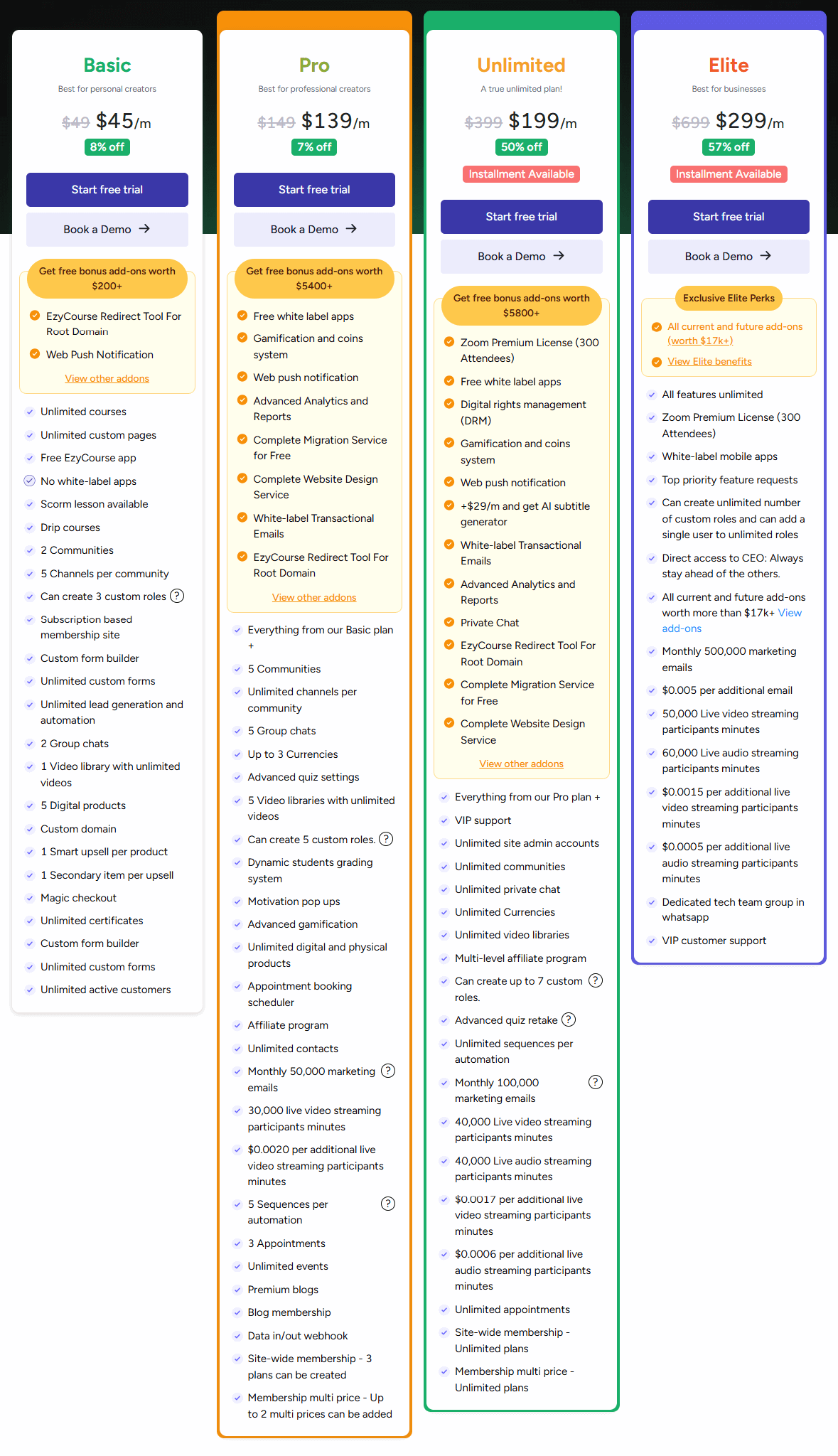
EzyCourse offers four different yearly pricing plans:
1. Basic: $45/month
2. Pro: $139/month
3. Unlimited: $199/month
4. Elite: $299/month
*Pricing may be subjected to change anytime

2. WordPress
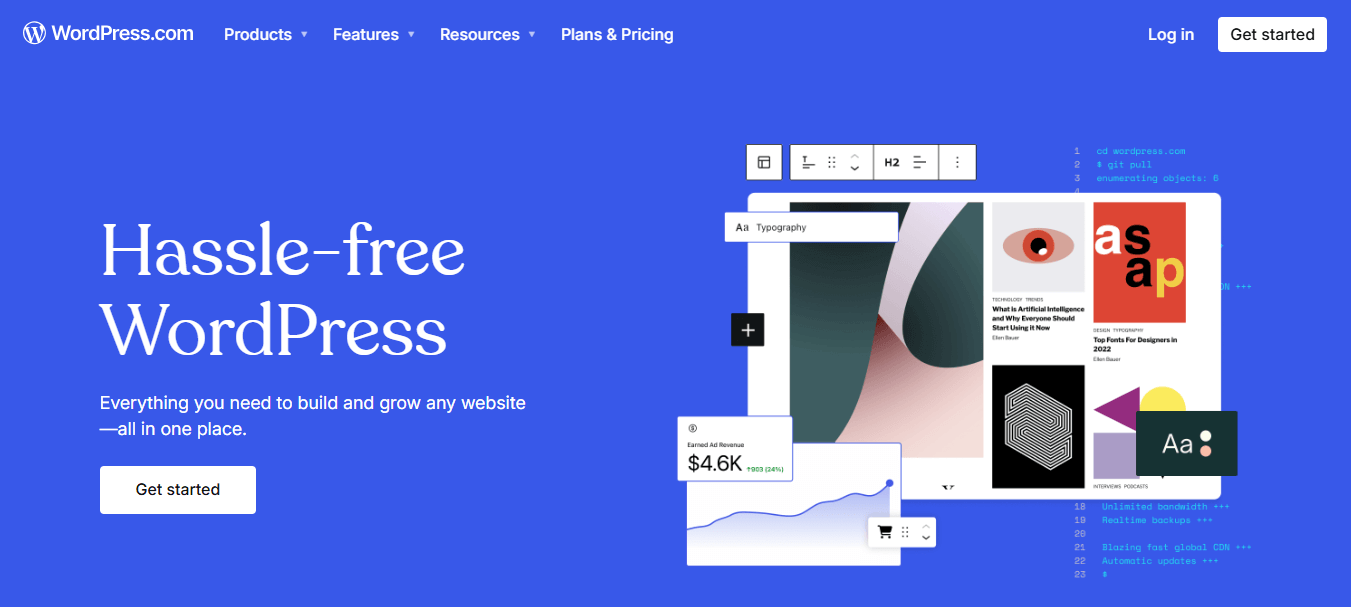
WordPress is a popular CMS, so many institutes use it for online courses. There are plenty of WordPress themes and plugins that help you build any type of website. WordPress lets you control every part of your site.
You can customize elements with plugins, a drag-and-drop builder, or custom code. It’s ideal for flexibility and growth. Many WordPress themes and plugins include course creation, student management, and payment features.
They also support interactive learning materials to enhance student experience. Also, many add-ons and integrations can improve the functions of an online course website based on WordPress. This encompasses various tools for email marketing, analytics, social media, and more.
Key Features
Full Design Control: You can choose from thousands of professionally designed themes or build your own from scratch to create a website that truly reflects your brand and vision.
Customize Everything: Your site is fully customizable. WordPress enables you to modify code, install plugins, and adjust settings to personalize every detail.
Easy Site Management: You have a simple dashboard that allows you to create, edit, and organize content. The simple interface and the user-friendly tools can get your site updated. You can publish blog posts and make changes of your choice in just a few clicks.
Higher Search Rankings: WordPress for online courses will make more money if it is optimized for search engines. You can attract more students and grow your audience with powerful SEO plugins like Yoast SEO and Rank Math.
Monetization: To monetize your expertise, you can integrate WooCommerce or LMS.
Sell Courses & Products: You can create, design, and sell engaging courses, quizzes, and certification programs with LMS plugins like LearnPress.
Scalable Growth: Your site can grow as your business grows. WordPress enables you to scale. Whether you start with blogging or an online course platform, you can scale by upgrading hosting, adding new features with plugins, and optimizing for higher traffic without ever having to switch platforms.
Easy Integrations: Connect with email marketing software, analytics platforms, and well-known payment gateways to automate and streamline your processes.
Full Content Ownership: Your data remains entirely yours. Unlike closed platforms that control your content and restrict customization, WordPress gives you full ownership of everything you create.
Community Support: WordPress has a vast community of developers, designers, and users who offer support, share plugins, and provide troubleshooting assistance.
Pros
Highly customizable
Large community and support resources
Scalable for any business size
Strong security features
Cons
Requires manual hosting and maintenance
Steeper learning curve for beginners
Pricing
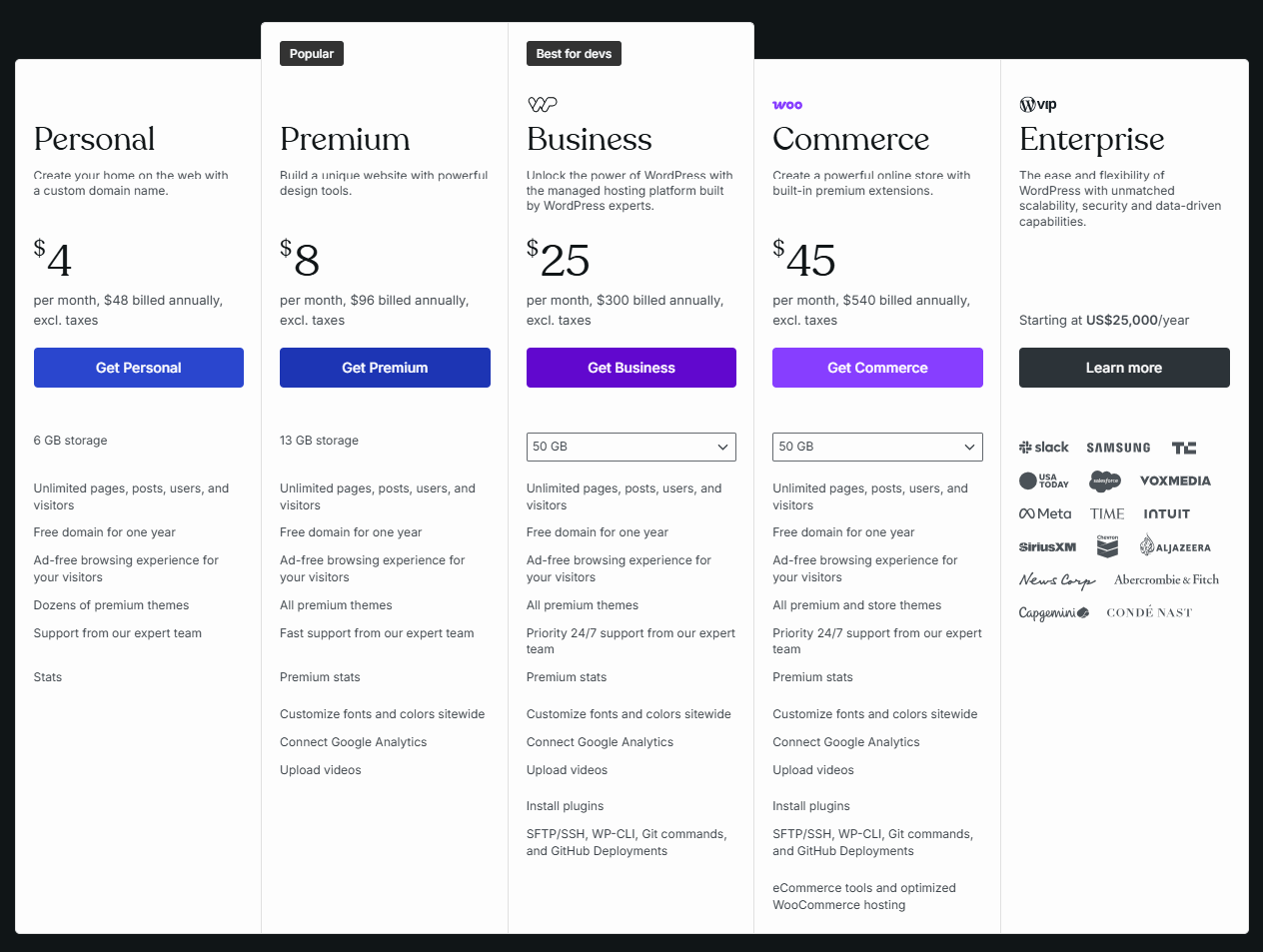
WordPress.com offers five pricing plans for course creators and entrepreneurs like you.
1. Personal: $4/month (billed annually)
2. Premium: $8/month (billed annually)
3. Business: $25/month (billed annually)
4. WooCommerce: $45/month (billed annually)
5. VIP Enterprise: Starts at $25,000/year

3. Shopify

Shopify is a top e-commerce platform. It helps sell products, services, and subscriptions. The platform offers built-in tools to simplify store management. Shopify is a better option for entrepreneurs rather than course creators.
However, you can still sell online courses in Shopify. There are two ways to offer courses. You can sell access to gated content. This includes courses, memberships, or exclusive material. You can also sell videos, blog posts, webinars, and audio files.
Shopify builds tools for global brands and businesses worldwide. It provides essential infrastructure for online sales. Whether you are a small-scale entrepreneur or an established businessman, Shopify supports your journey.
Key Features
Easy Store Setup: You can quickly launch and manage your online store without any hassle.
International Payments: With international payment options, you can receive payments from customers from around the world.
Manage on the Move: You can manage orders, view sales, and update your online store at any time from anywhere with Shopify’s mobile app.
No Limits on Traffic: Enjoy unlimited bandwidth so your store runs smoothly even during high-traffic periods.
Sell Online & In-Person: Shopify’s POS system lets you sell not just online but also in physical locations effortlessly.
Boost Your Visibility: Shopify’s powerful SEO features help your courses and products rank higher in search results.
In-depth Analytics: Advanced analytics give you deep insights into sales, customer behavior, and overall store performance.
Reliable Security: With SSL encryption and fraud protection, your store and your customers stay safe.
24/7 Customer Support: Help is always available for you via chat, email, and phone.
Pros
Beginner-friendly e-commerce setup
Reliable support and hosting
User-friendly interface accessible to beginners and non-techies
Free SSL certificate with all plans
Responsive Shopify themes that are compatible with any device
24/7 support through various channels
Mobile app for on-the-go business management
Extensive app marketplace
Scales easily as your business grows
Cons
Users need to pay transaction fees if not using Shopify Payments
Multi-user access is really expensive
Pricing
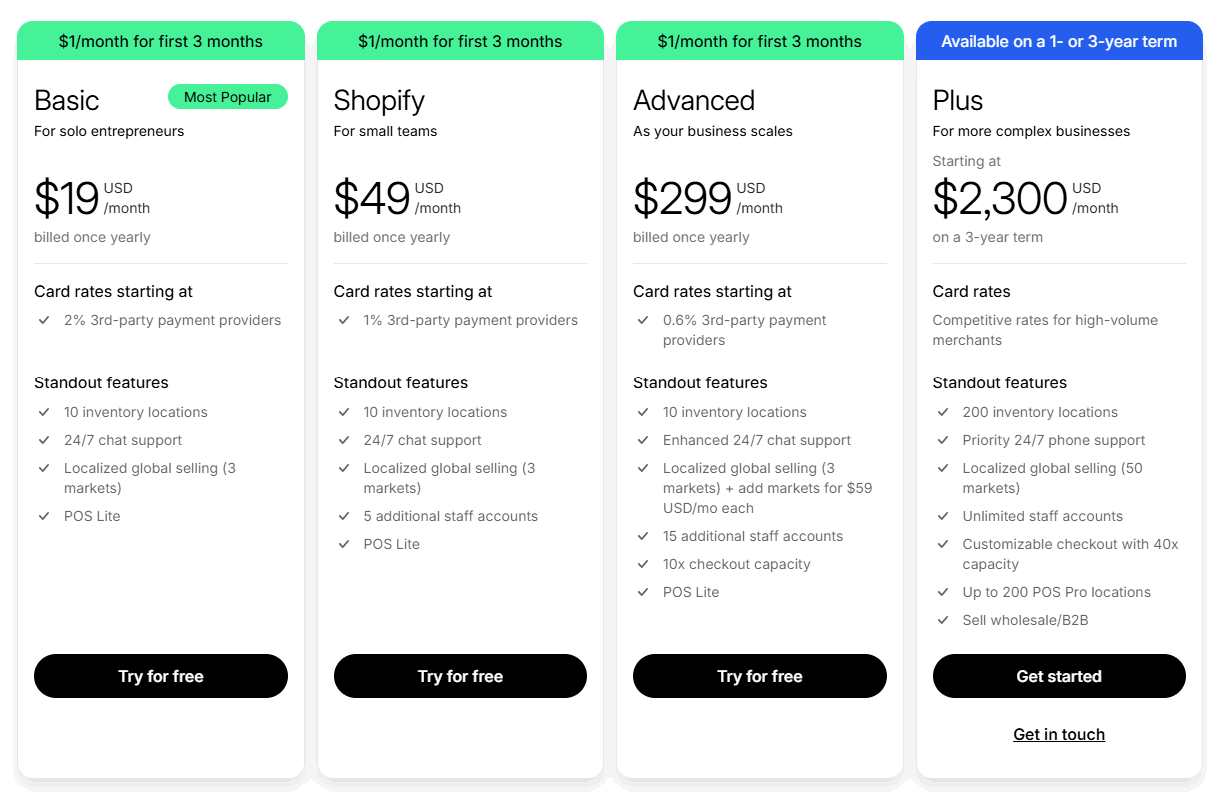
Shopify offers four pricing plans.
1. Basic: $19/month (billed annually)
2. Shopify: $49/month (billed annually)
3. Advanced: $299/month (billed annually)
4. Plus: Starts at $2,300/month (on a 3-year term)
Related read: Top 10 Best Shopify Alternatives in 2025| Full Comparison
4. Squarespace

If you want a visually stunning website without much technical effort, Squarespace is a great choice. It has elegant designs and a user-friendly interface. It includes everything to launch and grow your online course. But courses are just the start.
You can sell memberships, physical products, videos, appointments, and more. Squarespace grants lifetime access to your content with a one-time payment or subscription plan. With 0% transaction fees, your profits stay in your hands.
Key Features
Professional Templates: Stylish, top-notch templates are available on Squarespace for you to select from.
SEO-Friendly Structure: Your position on various websites is further enhanced by Squarespace’s effective SEO structure.
Sell Online Effortlessly: Integrated e-Commerce lets you sell your courses, products and services.
Mobile Optimization: Your site will look perfect on any screen.
No Coding Required: You can easily customize elements with a simple editor without coding requirements.
Membership Features: Squarespace’s membership features offer you gated content and exclusive access.
Pros
Beautiful and modern design options
Simple interface for non-technical users
Secure and reliable hosting
Cons
Limited app marketplace
Restricted customization options
Limited e-commerce capabilities
Pricing
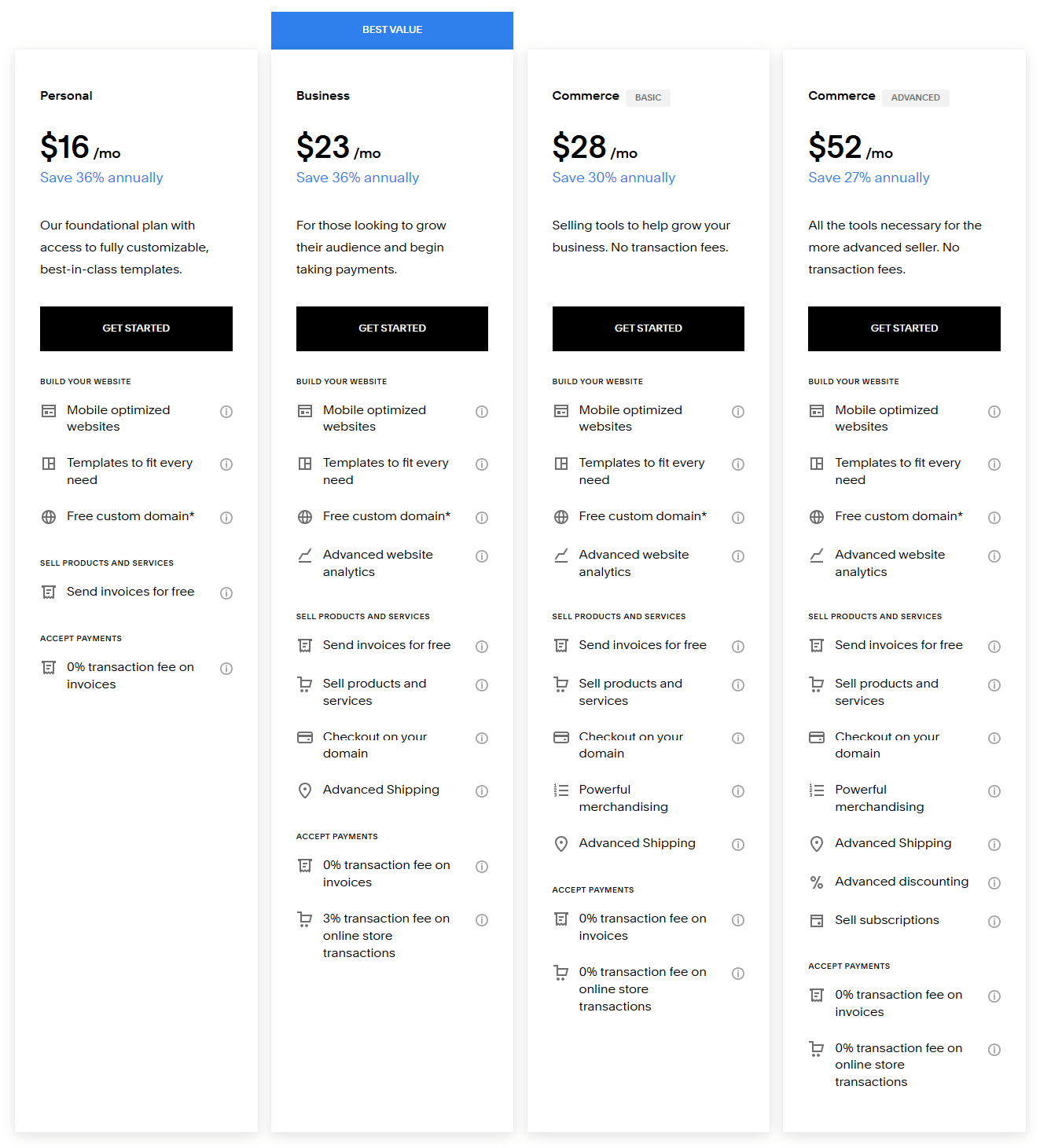
Squarespace offers four pricing plans for course creators and entrepreneurs and a custom enterprise plan for large businesses.
1. Personal: $16/month (billed annually)
2. Business: $23/month (billed annually)
3. Commerce Basic: $28/month (billed annually)
4. Commerce Advanced: $52/month (billed annually)
5. Enterprise: Custom plans

5. Webflow
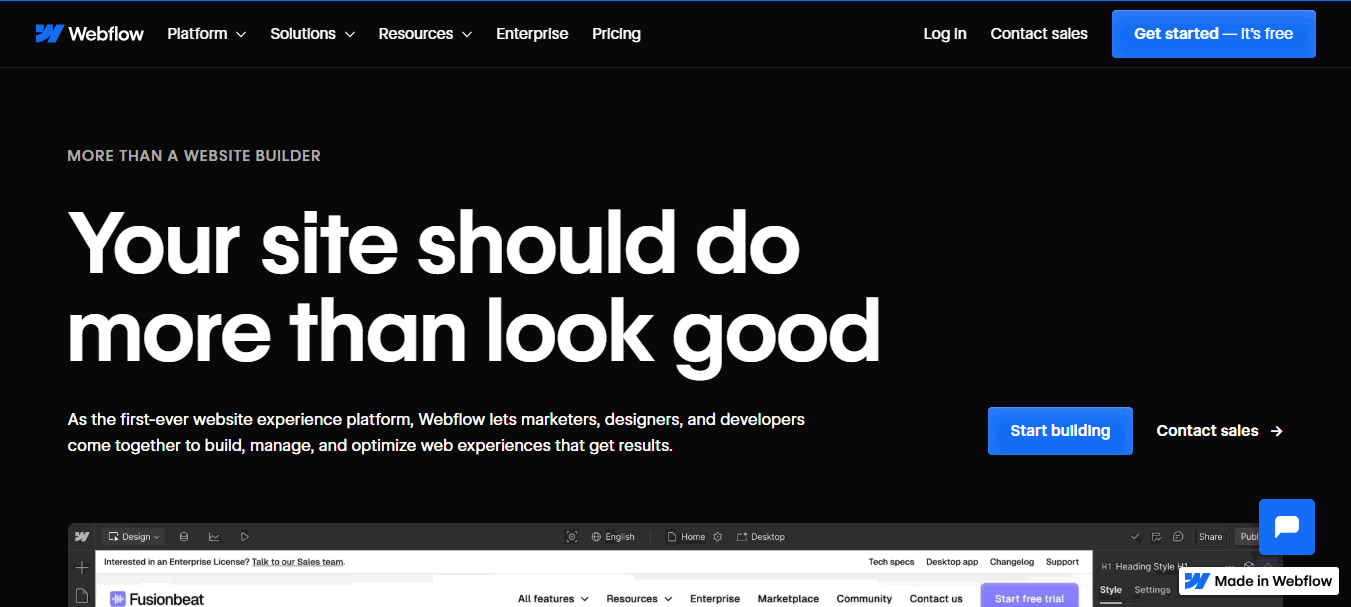
Webflow is a no-code website builder and hosting platform, revolutionizing how course creators and entrepreneurs design and manage digital experiences.
As a leader in no-code technology, it simplifies website development. You can build professional sites without writing any code. This saves both time and resources.
For course creators, Webflow offers customizable templates for quick site development. These templates include pre-built layouts and essential features.
They ensure a polished look and smooth user experience. Integrations with MemberStack enhance Webflow’s capabilities.
You can enable gated content and manage memberships. Seamless payment processing is also available. Whether you're launching a single course or an entire e-learning business, Webflow provides the flexibility and scalability needed to grow.
Key Features
Visual Web Design: Webflow enables you to create responsive websites with drag-and-drop elements, CSS grids, and flexible layouts.
CMS Integration: You have the option to manage your courses and dynamic content easily, automate SEO, and connect with external tools like Zapier.
Custom Branding: You are able to design unique websites with full creative control and custom code support.
Optimized Hosting and Security: Scale your site with robust hosting and built-in security features.
E-commerce Ready: You can sell your courses and other digital and physical products seamlessly through Webflow E-commerce.
Pros
Full design flexibility
No coding needed
Advanced motion design capabilities
Clean and efficient code output
Cons
Steep learning curve
More expensive than basic site builders
Pricing
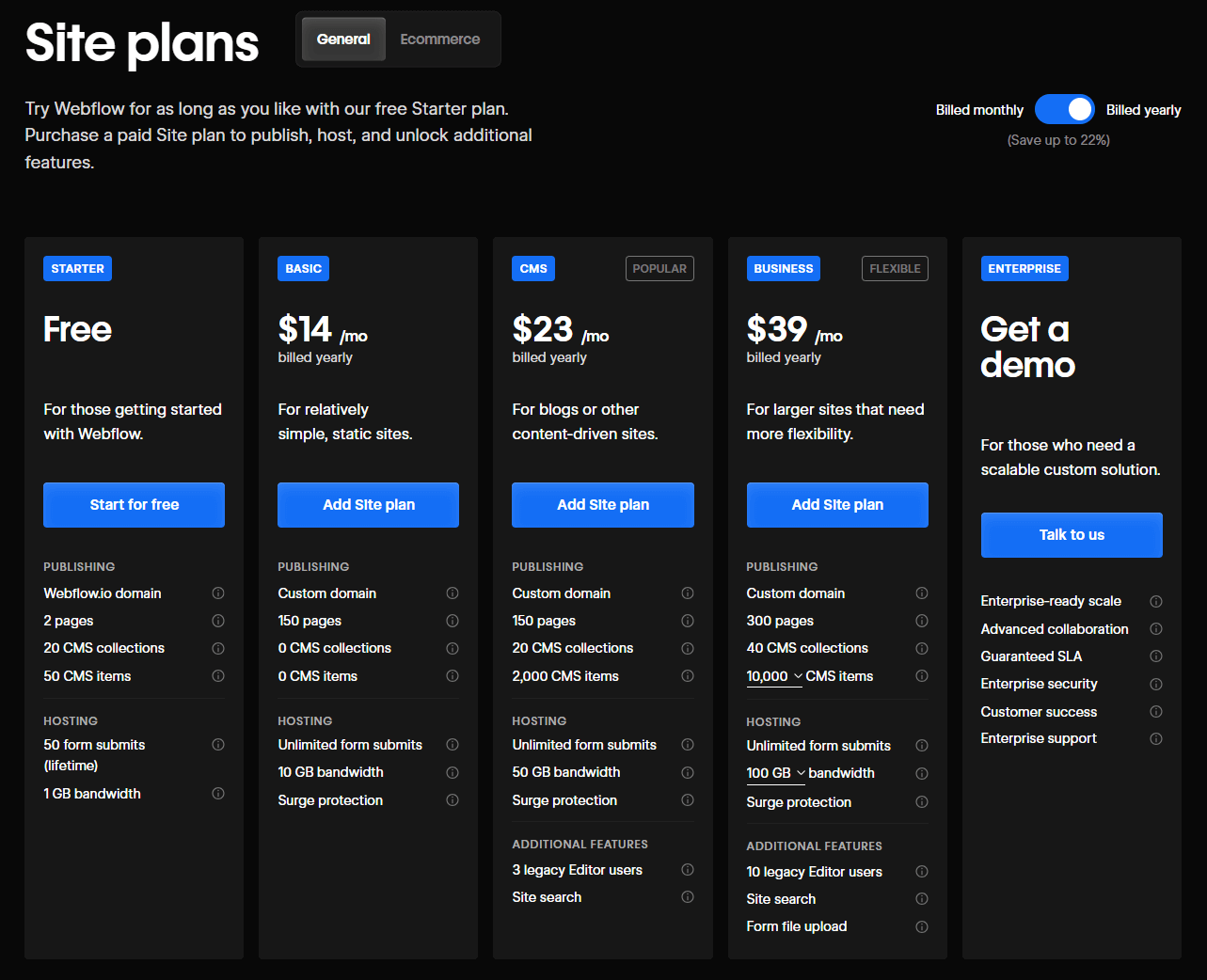
Webflow offers five pricing tiers for you.
1. Starter: Free
2. Basic: $14/month (billed annually)
3. CMS: $23/month (billed annually)
4. Business: $39/month (billed annually)
5. Enterprise: Custom pricing
6. Weebly

Weebly is an intuitive website builder that allows course creators and entrepreneurs to create professional-looking websites quickly and easily.
It’s designed to help you create, market, and manage your business. It offers a range of intuitive tools that make it simple to design a website, set up an online store, or launch a blog.
Weebly provides features to integrate your online courses, manage content, and even accept payments. With its user-friendly interface, Weebly helps entrepreneurs focus on growing their business and connecting with customers, all while keeping costs low and setup time minimal.
Key Features
Drag-and-drop builder: You can customize your site easily with a simple drag-and-drop interface. No coding knowledge is required.
E-commerce: Weebly allows you to set up secure payments and manage your courses and products effortlessly. You can streamline your entire online store.
Mobile-optimized: Your site will automatically adjust to look amazing on any device.
SEO tools: Weebly SEO tools boost your visibility and attract more traffic.
Marketing integrations: You can run email campaigns and ads directly from the platform.
24/7 support: Get the help you need, anytime you need it.
Pros
Easy-to-use interface, even for beginners
Effective solution for web design, e-commerce, and blogging
Affordable and scalable for growing businesses
Cons
Restricted customization options, unlike WordPress
Not as robust in advanced e-commerce features as specialized platforms like Shopify
Pricing
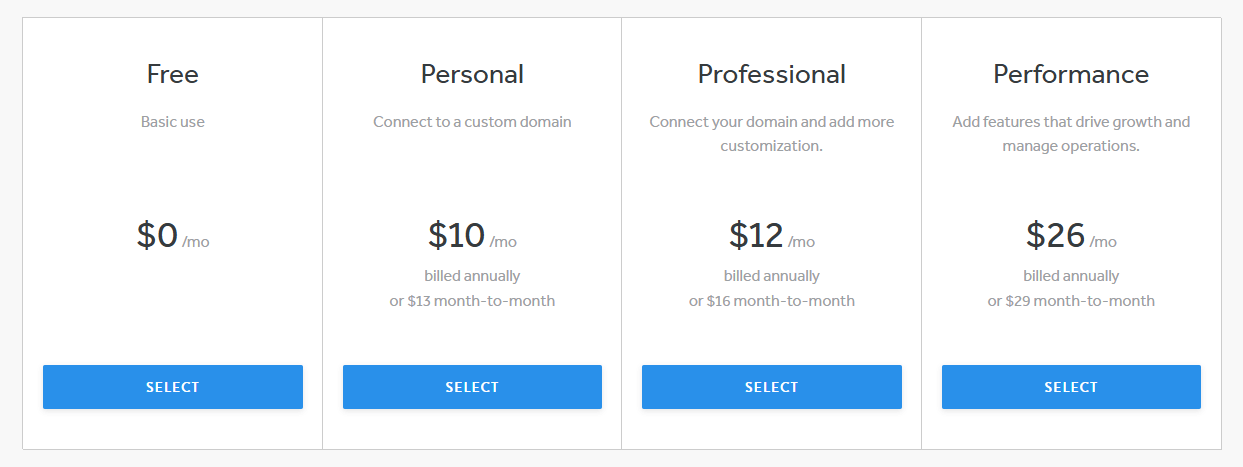
Weebly offers four pricing plans.
1. Free
2. Personal: $10/month (billed annually)
3. Professional: $12/month (billed annually)
4. Performance: $26/month (billed annually)
7. Webnode
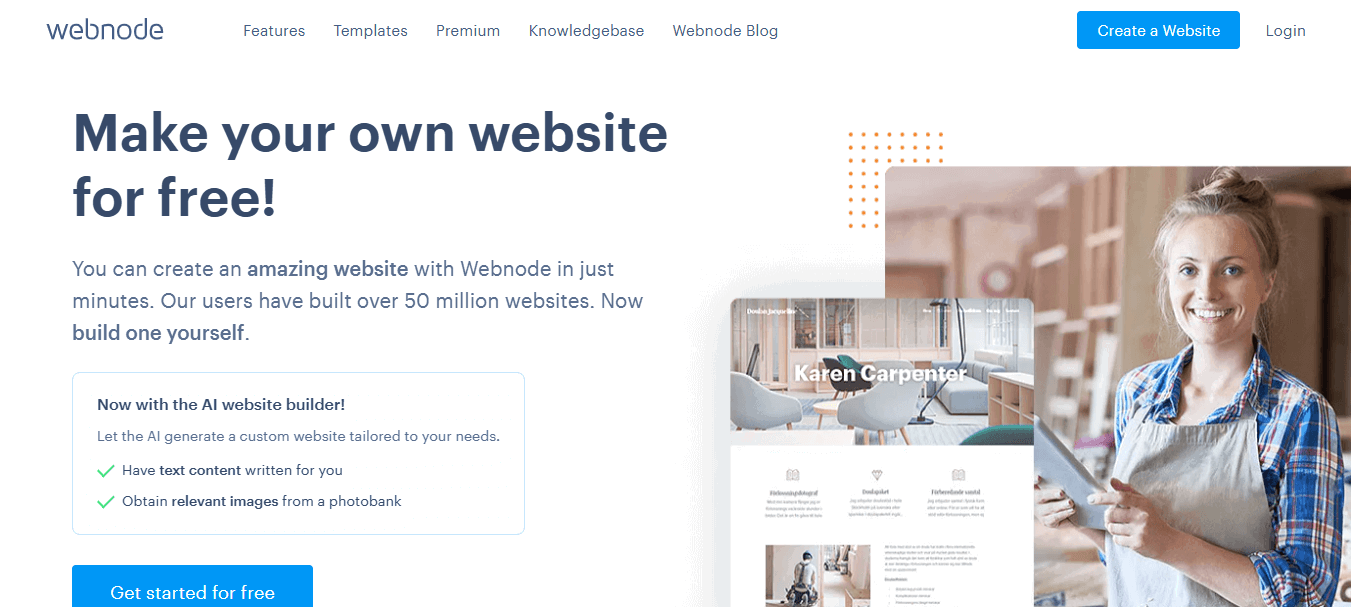
Webnode Webnode is a cloud-based website builder designed for bloggers, course creators, small businesses, and personal projects. It enables you to create professional websites with ease.
Course creators can integrate multimedia content, while entrepreneurs benefit from e-commerce features such as online stores, payment gateways, and inventory management.
Additionally, Webnode provides domain registration, web hosting, and secure data protection. This makes it a comprehensive and user-friendly solution for building and managing your websites.
Key Features
Drag-and-drop builder: You can move elements around and create your site effortlessly with the drag-and-drop builder.
Multilingual support: If you want to reach global customers, Webnode lets you build a website in multiple languages.
Free and custom domains: You can start with a free subdomain or connect your own for a more professional look.
E-commerce tools: You can sell your products with basic online store features, which are perfect for small businesses.
SEO-friendly setup: Webnode enables you to optimize your site for Google with built-in SEO tools.
Mobile-responsive design: Your site will look great on any device, automatically.
Pros
Super easy to use, even for beginners
Supports multiple languages for global reach
Free hosting is included, so no extra setup is needed
Budget-friendly pricing plans
No installation- just sign up and start building
Cons
Limited design flexibility compared to other builders
E-commerce tools are pretty basic, and they’re suitable for small stores but not for big ones
Pricing
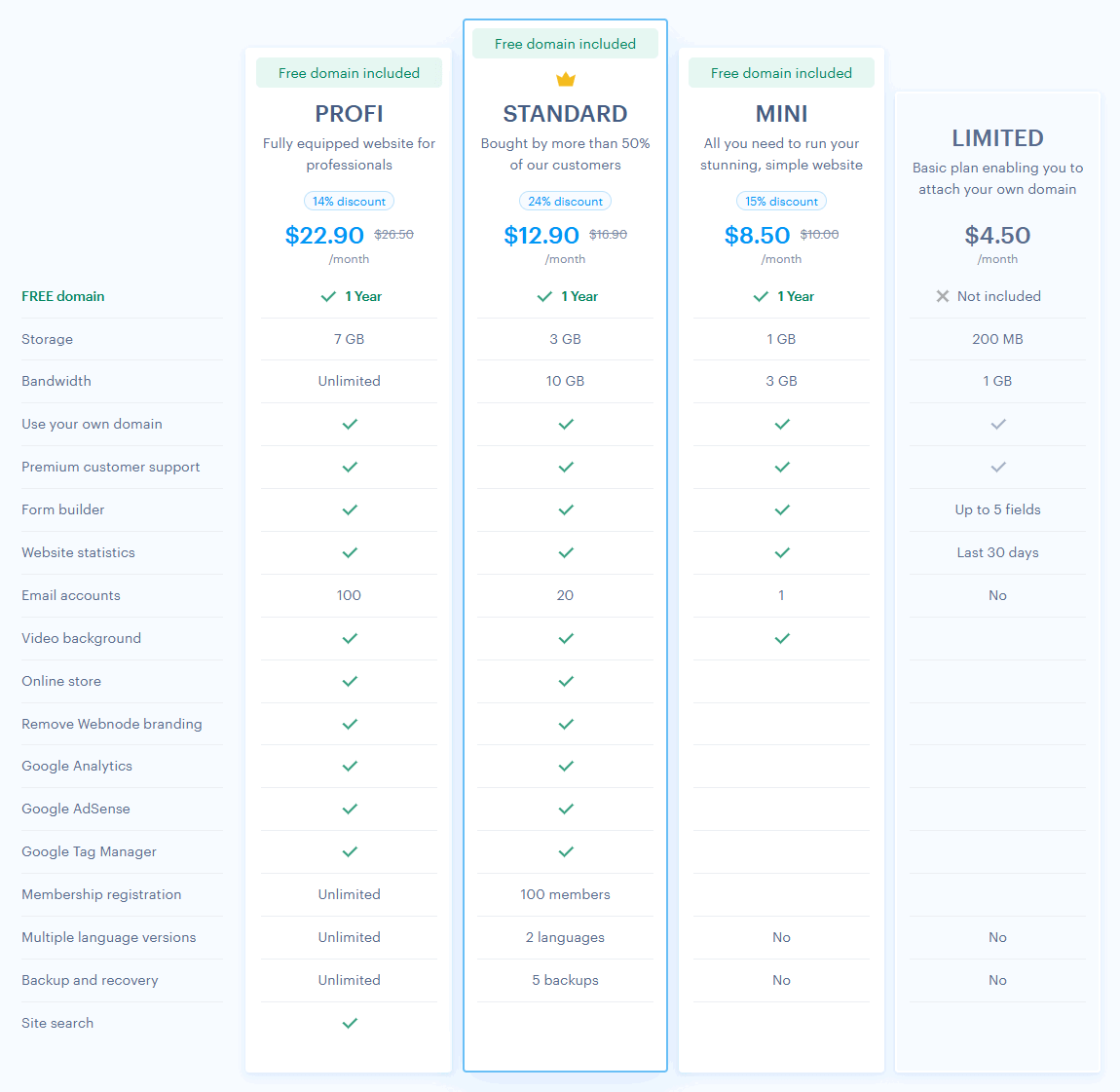
Webnode offers two different pricing categories. One is for website building, and the other is for e-commerce.
Website Plans
Profi: $22.90/month
Standard: $12.90/month
Mini: $8.50/month
Limited: $4.50/month
Ecommerce Plans
Business: $31.90/month
Profi: $22.90/month
Standard: $12.90/month
8. Duda
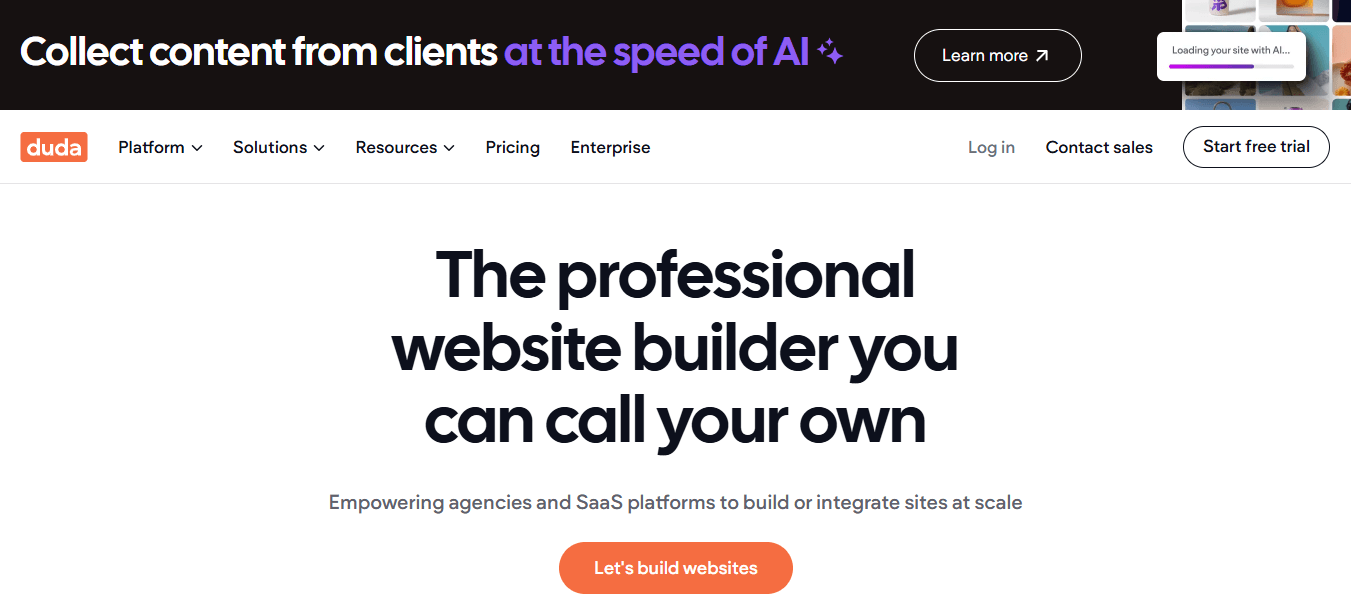
Duda is a sleek, powerful website builder. It is designed for agencies and freelancers. If you build sites for clients, this platform equips you with the tools to do it quickly and professionally.
With dynamic content capabilities and user-specific course creation, it’s an excellent choice for marketing. Plus, its uncomplicated drag-and-drop builder makes managing your online course business effortless.
Key Features
Simple Customization: Duda's drag-and-drop editor allows you to easily customize your site with professional templates- no coding needed.
Mobile optimization: Your website is mobile-friendly by default, ensuring a great experience for visitors.
White-label solution: Want to brand it as your own? Duda lets agencies resell their services with a White-label branding solution.
SEO and analytics: You are able to keep track of your site’s performance with built-in SEO tools and detailed analytics.
Pros
Impressive templates that give a professional vibe
Built-in tools for agencies, making client work easier
Fast-loading sites with high performance
Great for creating unique, personalized user experiences
Strong SEO tools for better search rankings
Cons
Higher price compared to basic website builders
Not as beginner-friendly
E-commerce options are not as advanced as dedicated platforms
Pricing
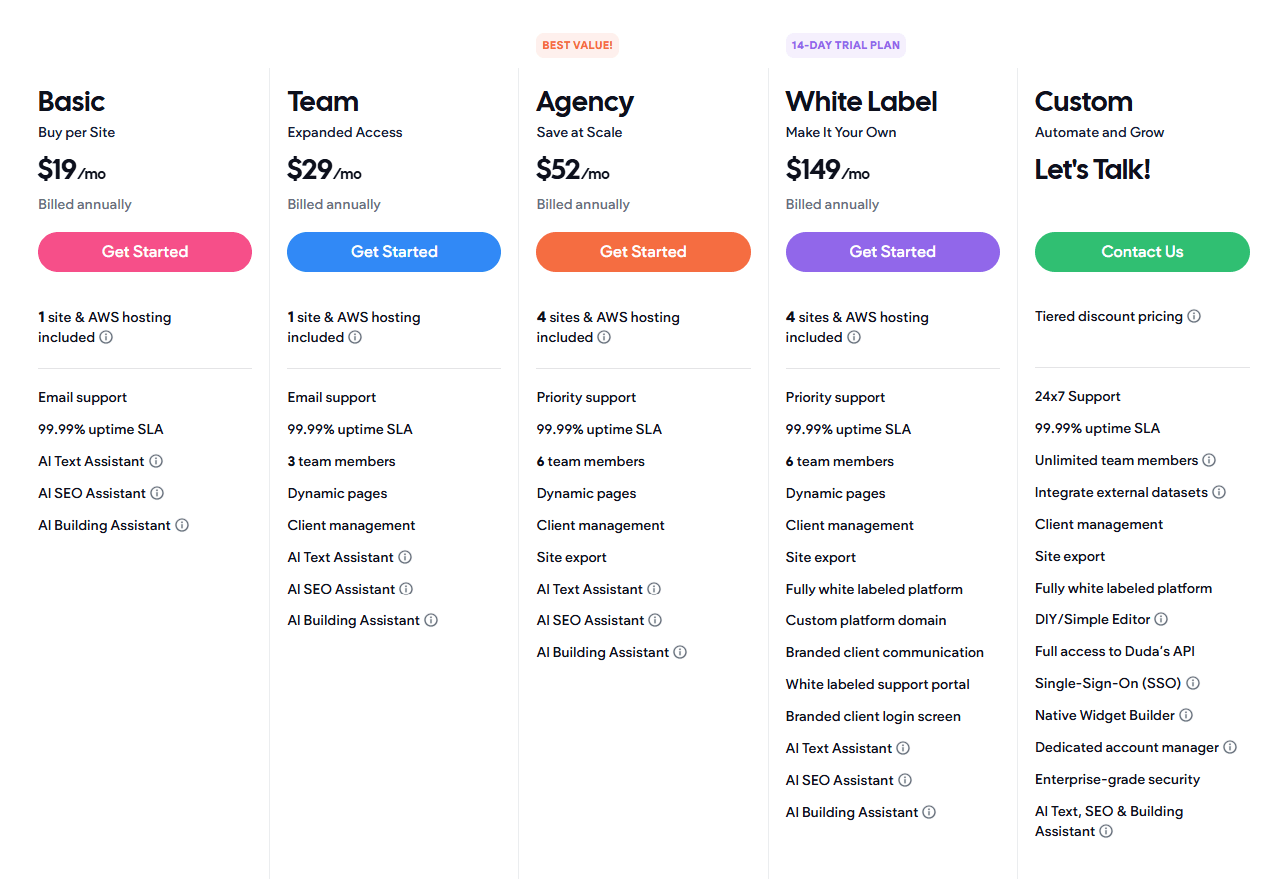
Duda offers five pricing plans.
1. Basic: $19/month (billed annually)
2. Team: $29/month (billed annually)
3. Agency: $52/month (billed annually)
4. White Label: $149/month (billed annually)
5. Custom Pricing
9. Hostinger Website Builder
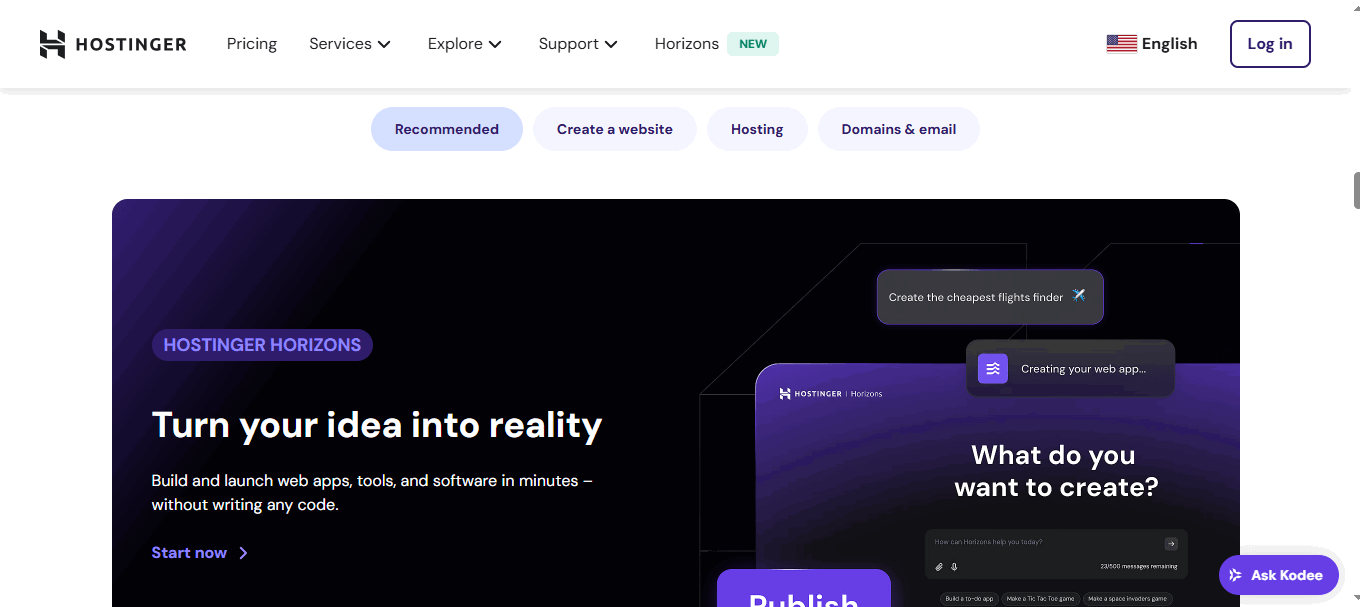
Hostinger is known for its affordable hosting, but it also has a website builder. It provides a range of services suitable for course creators and entrepreneurs looking to establish an online presence.
With Hostinger, you can launch your online course platform or business website. If you want a budget-friendly way to build and host a website in one place, this is a solid option.
Key Features
Affordable hosting plans: You can get reliable and secure hosting without breaking the bank.
AI-powered website builder: You need to just answer a few questions, and AI will create a site for you- super easy!
Free domain and SSL: Your site is secured and looks professional with a free domain and SSL certificate.
Drag-and-drop customization: You have the option to edit your site visually without prior tech skills.
E-commerce support: Hostinger allows you to set up an online store and start selling with ease.
24/7 customer support: Got issues? Hostinger’s support team is there to help you anytime.
Pros
Affordable website-building options
AI builder makes website creation super fast
Most plans offer free domain and SSL
Reliable hosting with good speed and uptime
Simple interface, great for beginners
Cons
Limited customization options
Fewer integrations compared to other website builders
Not ideal for large-scale businesses needing advanced functionalities
Pricing
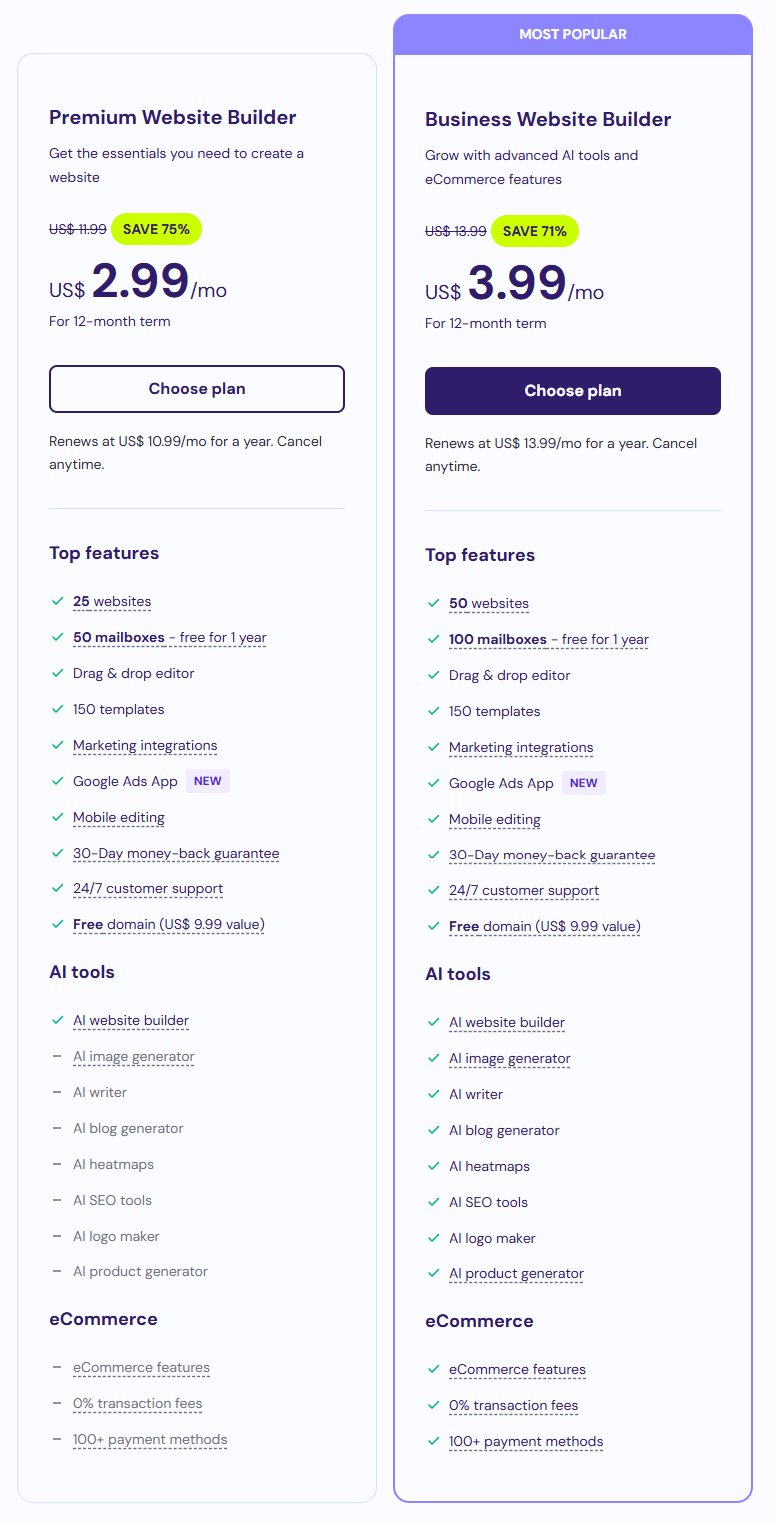
Hostinger offers multi-level pricing plans as it offers website building and domain and hosting services. I’m only focusing on the website building, where Hotinger offers two pricing plans.
1. Premium Website Builder: $2.99/month (for 1 year)
2. Business Website Builder: $3.99/month (for 1 year)
Note: The renewal cost of each Hostinger plan is higher than the initial cost. So, read the pricing details carefully before purchasing any plan.
10. Jimdo

Jimdo is another useful platform for course creators and entrepreneurs to build a professional website quickly and easily. You can share your expertise, attract students or clients, and establish trust- all without dealing with complicated tech.
Whether you're launching an online course, promoting your coaching services, or growing your business, Jimdo simplifies the process. So you can focus on creating, teaching, and scaling your business successfully.
Key Features
AI-powered website creation: Jimdo builds your site in minutes with its AI-powered website tools.
Custom domain and hosting: You don't need to worry about custom domain and hosting. Jimdo takes care of it for you.
Simple e-commerce tools: Featuring simple e-commerce tools, Jimdo allows you to sell your courses and other digital products online with an easy-to-manage store setup.
Mobile-friendly templates: Your website automatically adapts to mobile screens.
GDPR-compliant tools: If you’re in Europe, you’ll appreciate the built-in legal compliance features.
SEO and social media integration: You can optimize your site and connect it to social media platforms easily.
Pros
One of the easiest website builders to use
Great for freelancers and small businesses
Jimdo is GDPR-compliant, which makes it a good choice for European users
Affordable plans with a free domain option
AI assistance makes setup quick and effortless
Cons
Customization is pretty basic
E-commerce features are too simple for larger stores
Pricing
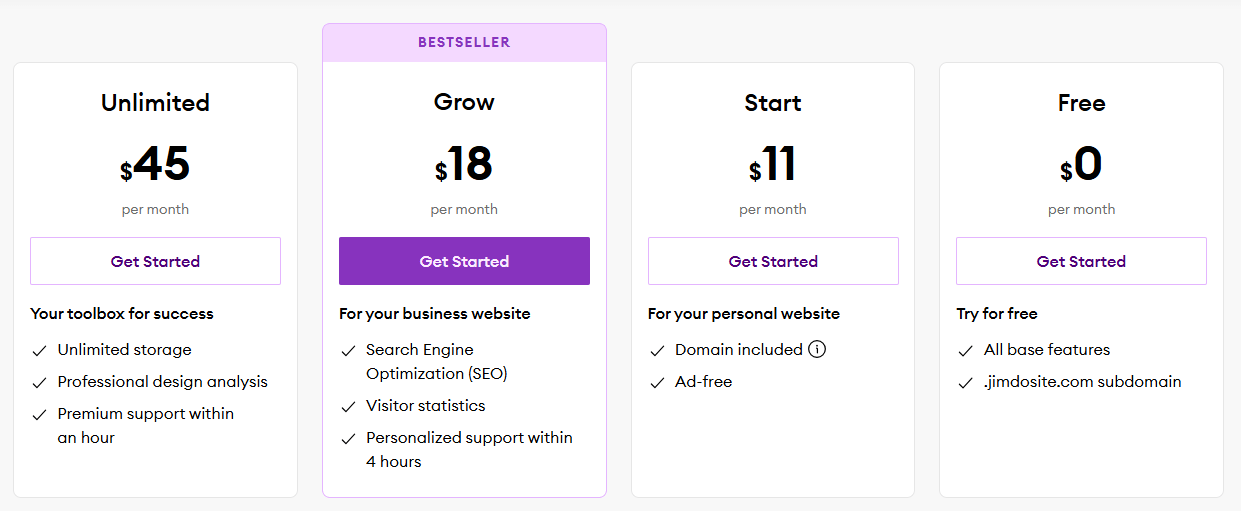
Jimdo offers four pricing plans to build websites.
1. Free
2. Start: $11/month
3. Grow: $18/month
4. Unlimited: $45/month
Note: Jimdo also offers three pricing plans to run online stores.
When Should You Consider Wix Alternatives?
Consider exploring Wix alternatives when your platform limits your business growth or creative potential. You can consider an alternative to Wix when you face any of the following issues:
Growing Business Needs: If your business grows, you may need more robust features, better integrations, or scalability that Wix can't provide.
Enhanced E-Commerce Requirements: As your sales increase, you might require better e-commerce tools to manage digital products, subscriptions, or larger inventories.
Greater Design Flexibility: If you need unique, custom designs beyond pre-built templates, look for a platform offering deeper customization.
Advanced Marketing and Automation: To boost engagement with integrated email campaigns, funnel management, and affiliate programs, seek a platform with built-in marketing features.
Superior SEO and Performance Control: If your SEO and site performance matter most, opt for a platform with granular control over settings, fast load times, and reliable hosting.
Complex Integrations: If you rely on third-party tools like CRM, webinar systems, or email marketing services, choose a platform with flexible integrations.
Branding and Domain Management: For advanced branding and custom domain management, look for a platform that offers greater control and customization.
Why EzyCourse Is the Best Wix Alternative for Course Creators
EzyCourse is the most ideal alternative to Wix for course creators and entrepreneurs, offering advanced, unlimited features at a cost-effective price. Here is why EzyCourse is the better option:
All-in-One Functionality: EzyCourse integrates course management, marketing automation, and e-commerce into one solution, streamlining your operations.
Customizable Course Experience: Create engaging learning experiences with tools for quizzes, certifications, and detailed analytics to enhance the learning journey.
User-Friendly Design: The intuitive interface allows you to easily customize your website and courses without technical skills.
Flexible Integrations: Integrate third-party services for email marketing, payment processing, and customer support, ensuring your platform grows with your needs.
Optimized for Performance and SEO: With fast load times and SEO optimization tools, EzyCourse helps your courses reach the right audience.
Scalability: Whether you’re starting small or scaling up, EzyCourse adapts to your increasing traffic and complex business needs.
That's why EzyCourse is the best alternative for those seeking to grow their businesses beyond Wix.

Choose the Best Wix Alternative to Boost Your Business
The top Wix alternatives offer a range of features, from simplicity and customization to scalability and community building. You must consider factors like budget, technical expertise, and business goals when selecting the ideal platform for course creation and entrepreneurship.
If you’re a professional course creator, try EzyCourse now to create a loyal community and grow your online business empire.

FAQs
Is there a better option than Wix?
Yes, platforms like Squarespace, WordPress, Shopify, and Weebly are better options than Wix for building websites.
Which Wix alternative is best for selling online courses?
EzyCourse is the best Wix alternative for course creators. It lets you create, market, and sell courses, memberships, and even coaching sessions. The best part is that it doesn’t require any extra tools or plugins.
Is WordPress better than Wix for course creators?
Yes, if you want customization and scaling flexibility, WordPress is better than Wix. With plugins like LearnDash or Tutor LMS, WordPress can turn into a full-featured online course platform.
Are there any beginner-friendly alternatives to Wix?
Yes! Weebly, Jimdo, and Hostinger Website Builder are great for beginners. They offer drag-and-drop editors, simple templates, and everything you need to launch a basic site fast.
What’s the easiest way to migrate from Wix?
While Wix doesn’t allow full exports, WordPress, Webnode, and Duda offer tools and guides that simplify the migration process. You might need to move some content manually.
Which platform offers the best value for money?
Hostinger Website Builder and Jimdo are very affordable for basic sites. If you're looking for value-packed features specifically for course creators, EzyCourse and WordPress are worth the investment.



